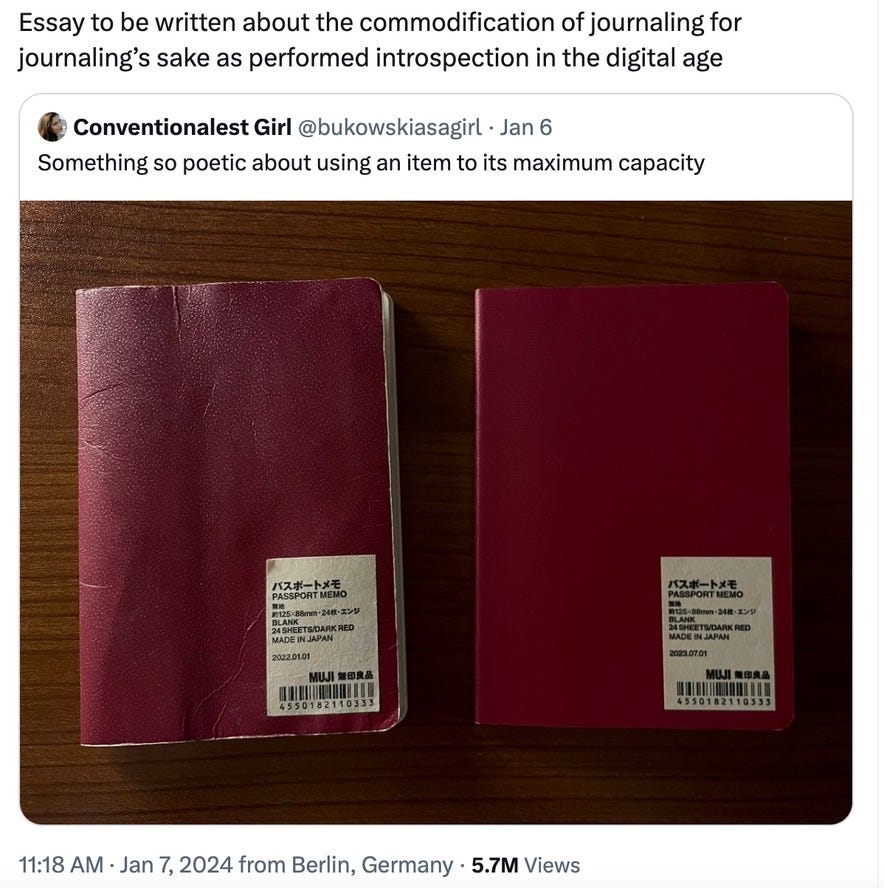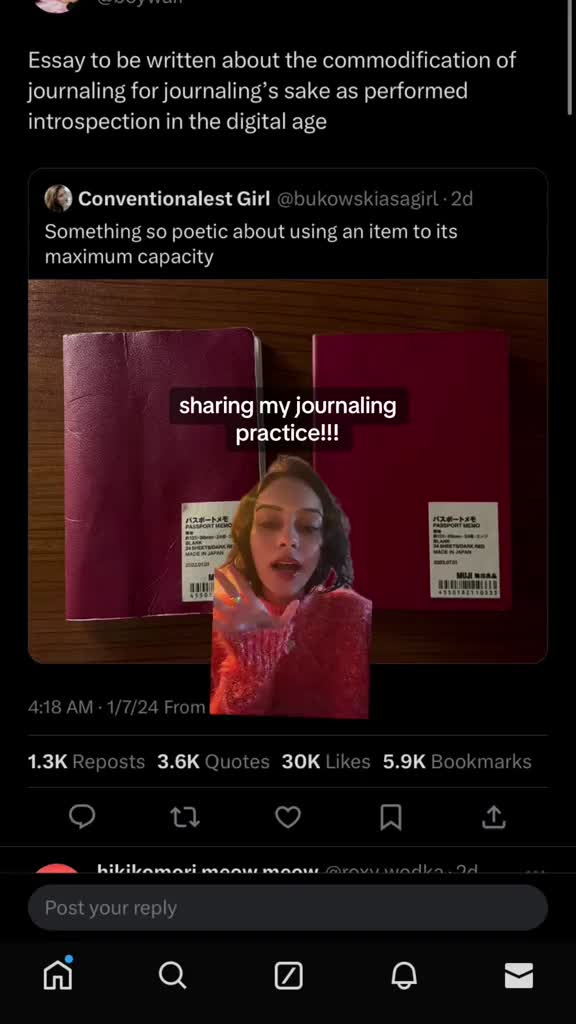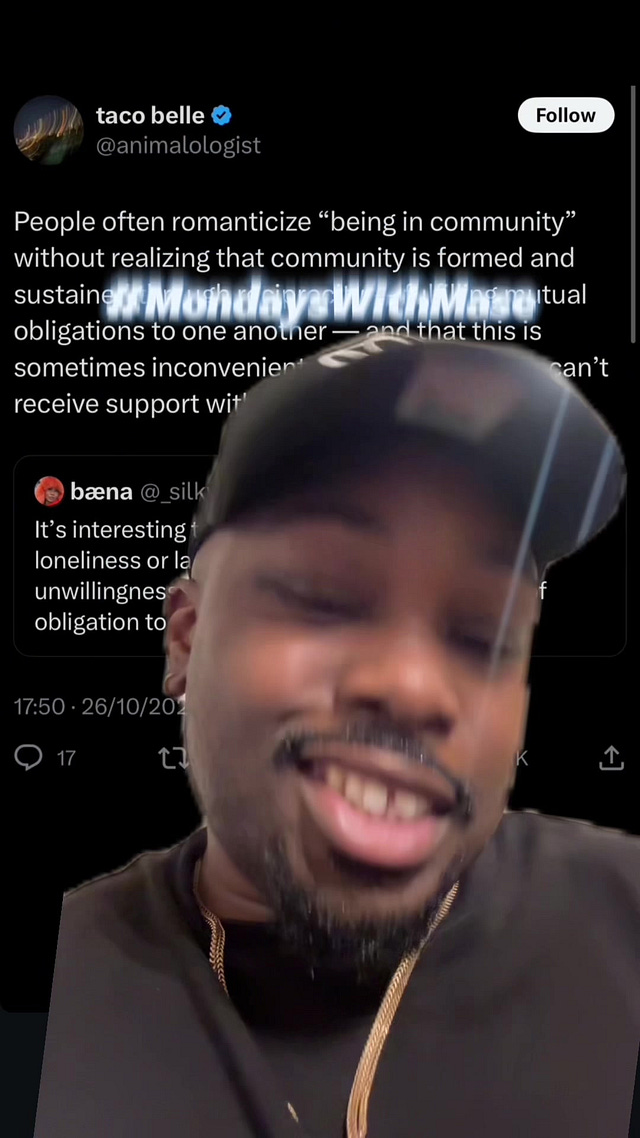055 - all the girlies are journalling
a look at journalling, from €200 louise carmens to Alphabetical Diaries
the allure of the blank page
It’s a little cliche, but doesn’t everyone fall into the journalling hole at the beginning of the year? The hope and potential of organising a year that hasn’t begun. Buying new, fancy products that will help you keep your life on track. My FYP knew this. It has been targeting me with posts about “how to set up 2025 journals”, “whats in my journals”, “Tea journal with me” with beautiful brands like paper republic, travellers notebook, louise carmen or hobonochi etcetera etcetera. These beautiful leather-bound journals — promising to be the answer to 2025.
I’ve always journaled. When my friends and I were in Chiang Mai for our gap year, we spent afternoons journalling and scrapbooking, after exhausting card games and reading. I know I don’t need the prettiest book. Still, it did not make me immune to videos of expensive, aesthetically perfect journals. There is a whole area of the internet of people dedicated to people who journal, or people who want to know how to journal. There is a whole area of the internet influencing people to buy into journals.
Here’s the truth though: “that hobonichi journal isn’t going to be what turns your life around”.
an excel diary
Ironically, this dive into the world of aesthetically perfect journals came around the same time I read Alphabetical Diaries by Sheila Heti (originally recommended by Rolien - thank you). As someone who often works in data, it was fascinating to find how Heti conceptualised her journal-memoir. “Heti entered over 10 years and 500,000 words of her diaries into Excel, then sorted the sentences in alphabetical order.” I struggled with this text. Not to say I didn’t like it. But if you forgot, I was already very annoyed at Olivia Laing’s Crudo, and this stream-of-consciousness writing. So this annoyance really carried over onto Heti’s work.
This type of writing isn’t the type of writing you dive into when you’re distracted or wanting to be distracted (not for me at least). It often felt like I was running to catch the thread of Heti’s mind as she jumps between the various moments of her life. I would be mentally out of breath, because I couldn’t keep up. No, this type of writing is the type of writing you dive into when you need guidance or insight. Every so often, something Heti wrote would stop me — not out of mental exhausted, but because of how profound they would be. Some of my favourite quotes:
“I saw how being with a friend in a new city, you were still in relation to the friend, but being alone in a new city, you were entirely in relation to the city itself”
“Ritual is the way the conscious mind communicates with the unconscious mind”
and my most favourite: “Write the book that this person would chose. Write your book, you self-indulgent fool.”
internet introspection
The more I thought about Heti’s experimental diaries and the journaling subculture, the more it reminded me of a tweet that I’d seen ages ago. When we write something so personal, for whatever reason, it seems weird then, that people post about it on social media.
Sumaiya writes about this internal-external conflict really well: “You can see it in the Booktok discourses on whether people are pretending to enjoy classics, Dostoyevsky’s name dragged through the mud because how could anyone enjoy his writing sincerely? A woman reads a significant number of books, many of which are children’s books and the internet declares her a liar, only for it to be revealed that she logged books she read with her 7-year-old child on Goodreads, hence the large number of children’s books.”
I hope you do read Sumaiya’s post. It reflects the culture of the internet right now. We’re in the peak of critical internet times. Platforms are being deplatformed, intellectualism is being put on trial and truth is so hard to discern.
She ends it by saying, “The inherently performative nature of social media, of having a public Twitter or Tiktok, the way we describe ourselves as having a “brand”, of “rebranding” is deeply unsettling when you really sit and think. What could have been a tweet that sought to appreciate the small joys in life instead snowballed into a discourse within a discourse. I guess what I am trying to say is (with love) GO OUTSIDE AND TOUCH SOME GRASS.”
Maybe the point isn’t to romanticise journaling or rail against its commodification entirely—it’s about how something so personal has become so public and profitable. A €200 leather-bound notebook is not going make your thoughts any more profound than the back of a crumpled receipt. With something as personal as journalling, tutorials on “how to journal” completely miss the point: the magic of journaling is that you’ve got to decide what works for you.
 Tiktok failed to load.
Tiktok failed to load.Enable 3rd party cookies or use another browser
field notes
WATCH: This Israelism documentary by Vice was a fascinating take on the conflict in Gaza. It made me think of Isabella Hammad,’s Recognising the Stranger. The short book explores the power of narrative, especially within the context of the Palestinian struggle.
BOOKS: I recently finished Rebecca (Daphne de Maurier), and I think its already going to be my one of my top reads of the year. De Maurier is a beautiful writer, and I’m reminded of someone on reddit who said, “I wish I could read Rebecca for the first time again”. I did not want this book to end. I wanted to read the book all over again. I was so consumed by the book I ended up watching both film adaptations one after the other (2020 Armie Hammer version sucked, and Hitchcock version was the best). Also, I’m going to be a real nerd right now and tell you about an app called Storygraph. A reading tracking app not owned by amazon, but by #womeninstem Nadia Odunayo! After doing a goodreads challenge last year, it made aware of how unintentional the challenge can be — focusing on quantity rather than quality. Storygraph’s challenges include prompting readers to explore different genres (a graphic novel, or a poetry collection about nature); finding books using different features of the app or reading authors from different countries (the Phillippines, Egypt or Iceland). I’m obsessed.
TRENDS: It’s been raining non-stop in South East Asia, and in Singapore, creators are lapping up the “cold weather”, and adopting sweater weather. Hilarious. I am using Arca but only to collect videos about (pretty) pickles, I am sure I will start using it to collect real and important things online too. Nicky Yaep is on mission to find inclusive places in KL for the LGBTQI community to feel safe!
ARTICLES: Ally Louk wrote her Phd on “Olfactory Ethics: the politics of smell in modern and contemporary prose” last month, and divided the internet (this reddit thread explains it). The Pudding looked into whether the love song is in decline in a beautiful data-driven website. And lastly - It feels like we’ve been talking about the loneliness crisis a lot. Whenever I hear about it though, I wonder how much of this is “self-inflicted”. As someone who has been flaky a lot recently, it’s interesting to see quantitative research about the science behind flaking. It makes me think of the principle about whether we owe each other anything, and how harmful this principle is to building and maintaining communities:









